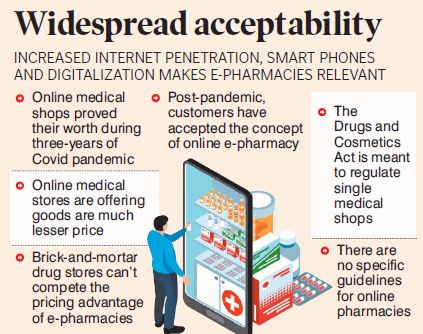A few days ago, the DCGI, which is part of the MOHFW, issued a notice to some e-pharmacies making it clear that it was considering closing them down entirely
Posted on – Thu 06 Apr 23 at 12:45pm

representative image
Hyderabad: Over the past few years, especially in the wake of the Covid pandemic, people have come to accept the relevance and usefulness of e-pharmacies (online pharmacies), not only in Telangana but across the country, despite streamlining and regulatory guidelines for the industry yet The introduction of regulatory authorities to implement.
The e-pharmacy started offering its services in Telangana and other parts of the country around 2014 and 2015. Since then, brick-and-mortar pharmacies, which have been the undisputed leaders in the pharmaceutical retail market, have turned against the online concept of drug trafficking.
Every now and then, a powerful national body representing associations of pharmacists and chemists across India lodges complaints against e-pharmacies, prompting the regulator to issue cause notices to digital pharmacies.
A few days ago, the Drug Control Directorate of India (DCGI), under the Federal Ministry of Health and Family Welfare (MOHFW) in New Delhi, acted on similar complaints by issuing notices to some e-pharmacies, making it clear that it is considering shutting down the concept of digital pharmacies entirely.
Does a blanket ban on digital pharmacies seem feasible in an era when digital pharmacies have become accepted largely due to increased internet penetration and the ubiquity of mobile devices?
How big is the potential for e-pharmacies?
A December 2021 report by KPMG on the future of e-pharmacy in India stated, “India’s e-pharmacy market is expected to grow at a CAGR of 40% to 45% compared to the global The e-pharmacy market is expected to grow at a CAGR of around 15% to 20%.The KPMG report added that the Indian e-pharmacy market operates close to 50 e-pharmacies, accounting for 14% of the total e-pharmacy revenue in Asia Pacific in 2020.
What are the main challenges facing e-pharmacies?
While there are many positives for e-pharmacies, the fact is that the regulatory framework aimed at simplifying the industry has yet to be implemented. The laws governing the sale of medicines in India under the Drugs and Cosmetics Act apply to regulate independent medical shops. In the absence of guidelines, these laws that apply to brick-and-mortar pharmacy businesses also apply to digital pharmacies.
The Drugs and Cosmetics Act mandates that only licensed retailers can sell medicines in brick-and-mortar medical stores. The Act also stipulates that a qualified pharmacist must be present when medicines are sold in pharmacies. Apart from the lack of a strong regulatory framework, another major challenge faced by e-pharmacies is data security and the threat of cyber-attacks as they have to deal with highly personal data of customers. Security breaches can expose hundreds of thousands of customers’ valuable data to criminals.

